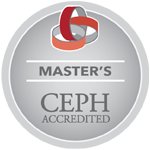Core Curriculum: Health Behavior & Promotion
In the first year of the MPH Program, students take classes in the six core areas of public health:
Core Curriculum
| Code | Course |
|---|---|
|
CHLH 410 - Public Health Practice
Hours: 4 |
|
|
CHLH 469 - Environmental Health
Hours: 4 |
|
|
CHLH 540 - Health Behavior Theory
Hours: 4 |
|
|
CHLH 550 - Health Policy
Hours: 4 |
|
|
CHLH 572 - Principles of Epidemiology in Public Health
Hours: 4 |
|
|
CHLH 573 - Biostatistics in Public Health
Hours: 4 |
Course Descriptions
CHLH 410: Public Health Practice
Theory and practice of public health promotion as they relate to educational approaches in solving community health problems.
CHLH 469: Environmental Health
Appreciation of the concepts used to prevent environmental conditions that may threaten health. Topics include air pollution, water supply management, waste management, radiation protection, food hygiene, occupational health and disaster management.
CHLH 540: Health Behavior Theory
Analysis of social science theories and perspectives that comprise the foundation of health education theory and practice. Includes development of a conceptual frame of reference for understanding, predicting, and facilitating change in health behaviors.
CHLH 550: Health Policy
Comprehensive analysis of the policy process in health care in the United States; systematic and critical review of health policy development, implementation, and evaluation; impact of government at all levels and the role of providers, industry, labor, and consumer in health policy.
CHLH 572: Principles of Epidemiology in Public Health
Application of epidemiologic methods to public health, including descriptive epidemiology, analytic study designs (case-control and cohort studies and randomized trials). Examples of applications focus on public health issues in chronic disease and infectious disease prevention and control.
CHLH 573: Biostatistics in Public Health
Application of statistical methods to epidemiology, clinical and diagnostic medicine, and laboratory biomedical experiments. Topics include descriptive statistics and graphics, reliability, sample size estimation, contingency table analysis, analysis of group differences, survival analysis, correlation and linear regression. Emphasizes use of computerized statistical software in biomedical data analysis.


